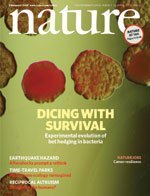 Research by an international team of scientists including Professor Paul Rainey from the New Zealand Institute of Advanced Study has shown something very interesting: bacteria, much like people and many other organisms, hedge their bets against the uncertainties of the future.
Research by an international team of scientists including Professor Paul Rainey from the New Zealand Institute of Advanced Study has shown something very interesting: bacteria, much like people and many other organisms, hedge their bets against the uncertainties of the future.
The paper, titled Experimental Evolution of Bet Hedging and featured as the cover story on Nature this week, showed not only that bacteria engage in this behaviour, but also how the strategy evolves. In essence, test populations of experimental bacteria were exposed to very different environments within relatively short spaces of time, and noticed that some populations, instead of reacting to the environments, appeared to anticipate possible futures: although sharing the same genetic ancestry, the bacteria formed different types of colonies.
The ability also evolved very quickly – far more quickly than one might suspect – suggesting that it may have been important for very early bacteria who, even though they would not have been able to sense, and respond, to environmental changes, would nonetheless have been able to survive any changes. As such, it seems that bet-hedging may have been one of life’s earliest adaptations to uncertainty.
News coverage